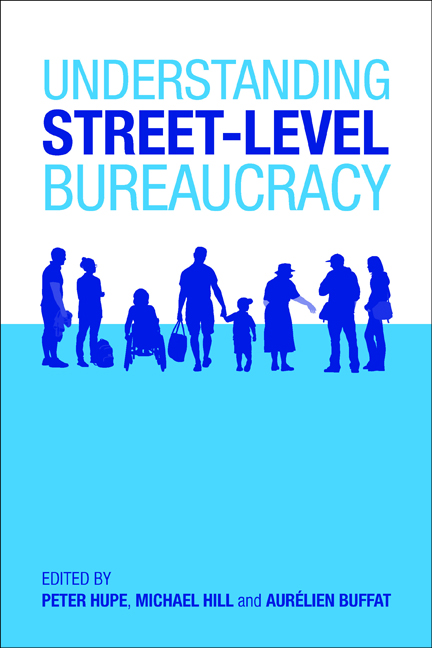Book contents
- Frontmatter
- Contents
- Biographical notes
- Preface
- Part One Introduction
- Part Two Delivering services and benefits: street-level bureaucracy and the welfare state
- Part Three Agents of the state: street-level bureaucracy and law enforcement
- Part Four Embedded in society: street-level bureaucrats as public actors
- Part Five The management of street-level bureaucrats
- Part Six The promise of professionalism
- Part Seven Conclusion
- References
- Index
Fourteen - Service workers on the electronic leash? Street-level bureaucrats in emerging information and communication technology work contexts
Published online by Cambridge University Press: 08 March 2022
- Frontmatter
- Contents
- Biographical notes
- Preface
- Part One Introduction
- Part Two Delivering services and benefits: street-level bureaucracy and the welfare state
- Part Three Agents of the state: street-level bureaucracy and law enforcement
- Part Four Embedded in society: street-level bureaucrats as public actors
- Part Five The management of street-level bureaucrats
- Part Six The promise of professionalism
- Part Seven Conclusion
- References
- Index
Summary
Work organisation in e-government
E-government enables on the basis of information and communication technology (ICT), new organisational forms that can increasingly be observed in practice, such as in one-stop government. This particular form of e-government consists of a central entry point to all public services that can be implemented through physical access channels (eg a walk-in office) or through the telephone channel, such as the single Public Service Number (PSN). No matter what channels are used, providing an entire array of diverse services from a single point makes new cross-organisational cooperation at operational level necessary. The structure and dynamics of work organisation have changed. In particular, due to the use of ICT as the main communication channel, the day-to-day work of call centre agents in public organisations has changed: they confront a wider variety of citizens’ requests and have to decide about the delivery of a larger amount of information and information sources. Which skills and discretion levels the agents apply to their tasks might be very diverse, affecting their characterisation as street-level bureaucrats. In this chapter, we argue that ICT does not decreases the decision capacities and discretion of call centre agents, but, to some extent, requires an extension of decision autonomy during the ICT-mediated interaction with citizens. Thus, e-government work, particularly in one-stop government contexts, can be characterised as street-level bureaucracy. I base my arguments on an empirical exploration of the extent of change at the working and management level in ICT-based one-stop government.
Lipsky's (2010) theory of street-level bureaucrats forms the theoretical basis for this chapter, in combination with some system-theoretical considerations on so-called boundary spanners. This theoretical perspective will be used to explore and discuss the implications for the change of work organisation and its control. Based upon these theoretical considerations, it is possible to derive the hypothesis that ICT, on the one hand, reduces the scope of action of and contributes to tighter control in a one-stop government organisation, which may result in the deskilling of street-level staff. On the other hand, we can argue that the scope of action will increase since a wide range of services must be conducted by a single person.
- Type
- Chapter
- Information
- Understanding Street-Level Bureaucracy , pp. 243 - 260Publisher: Bristol University PressPrint publication year: 2015
- 1
- Cited by



